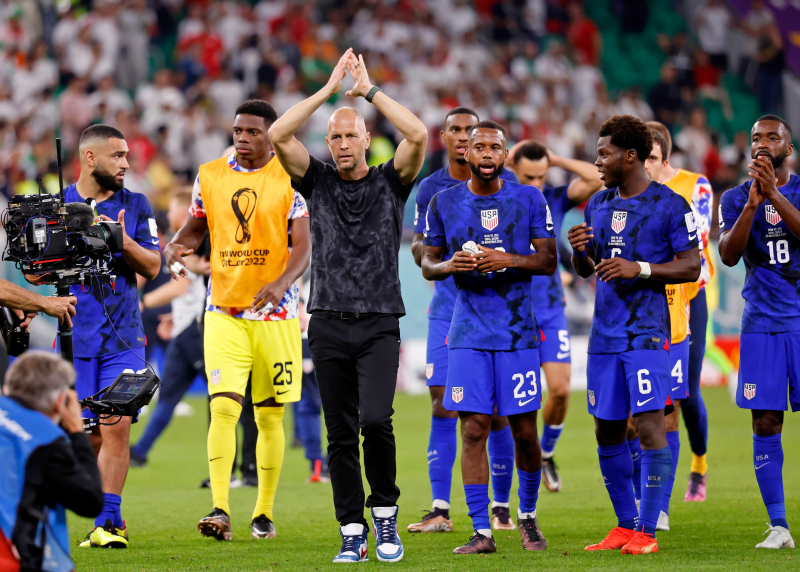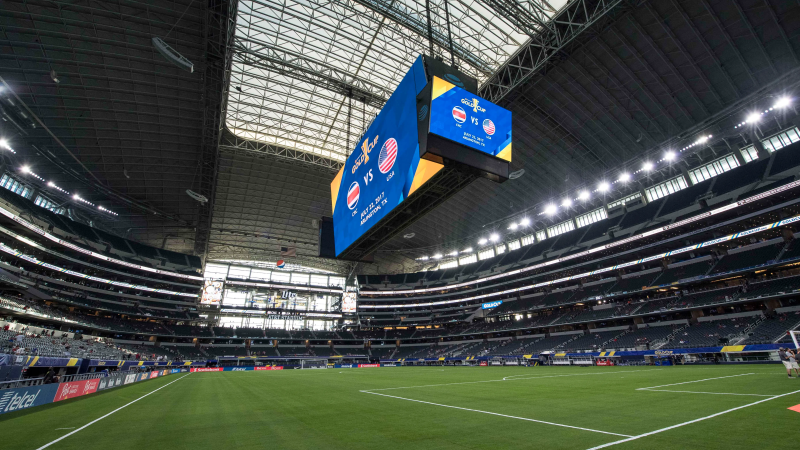Gregg Berhalter has lofty goals for the 2026 World Cup – and a roadmap to achieve them
WASHINGTON — The 2026 World Cup still feels an eternity away, with more than 800 days to go until the U.S. men's national soccer team plays its first group-stage game in Los Angeles.
For USMNT coach Gregg Berhalter, however, the planning for 2026 has long since begun. The next two-plus years will be crucial. And the expectations for the next World Cup − which will be the first men's iteration on U.S. soil since 1994 − are both lofty and clear.
"There's varying degrees of success, in my opinion," Berhalter told USA TODAY Sports on Wednesday. "But I think it starts with going to a round or getting to a place where we haven't been before."
And that, for the U.S., would mean making it all the way to the semifinals.
"I think that's where you start to say, 'Wow, this group really did something with that,' " Berhalter continued.
"The United States would be crazy. It would change soccer in America forever."

It's an audacious goal, to be sure − especially for a team that has won just one knockout-round game in modern World Cup history, against Mexico in 2002. But with another key international tournament, the Copa América, coming to the U.S. later this year, Berhalter has been clear about what's at stake for this current crop of players − and what needs to happen over the next two years for them to best position themselves for a deep World Cup run.
Because the USMNT already has a guaranteed place in the 2026 World Cup field, as one of the event's three host nations, it will not have to survive the usual gauntlet of Concacaf qualifying. Berhalter said the qualification process helped strengthen the USMNT's core group of players ahead of the 2022 World Cup, but the tests they need this time around are different.
"Now this group has to learn how to beat better teams, not how to beat, you know, Jamaica away. We're beyond that," Berhalter explained. "That's still going to be difficult, but our bigger challenge is how do you set the team up to beat Argentina at home in front of 80,000 people? That's our bigger challenge."
Berhalter, 50, led the USMNT for a little more than four years until his contract expired at the end of 2022, after the U.S. reached the Round of 16 at the Qatar World Cup and was eliminated by the Netherlands. After six months under two interim coaches, U.S. Soccer ultimately opted to rehire Berhalter in June. His current contract runs through the conclusion of the 2026 World Cup.
In the absence of Concacaf qualifying, Berhalter likened the team's World Cup prep to building a brick wall. He said one metaphorical brick will be experience in knockout-style competitions like Copa América, where the U.S. will face Bolivia, Panama and Uruguay in Group C. Another will be exhibition experience against top-tier opponents, like the June 8 friendly against Colombia that was announced Tuesday. (The U.S. is also slated to play Brazil on June 12, according to multiple news reports.)
"Anytime we have a friendly game, we're trying to play the best possible opponent we can," he said. "The whole idea (in) building this group is that by the time we get to the World Cup, there's comfort in the fact that OK, we've done it before. We played against the best. We played in knockout competition. We're ready to go."
The 2024 Paris Olympics, which begin 10 days after the end of Copa América, are also part of the equation. While Berhalter said the U.S. will prioritize Copa América, there are several regular starters who would be age-eligible to compete in Paris, such as Gio Reyna and Yunus Musah. (At the Olympics, men's soccer rosters must consist of players who are 23 or younger, with three allotted exceptions per country.)
Berhalter said he has had casual conversations with some USMNT players about their possible interest in going to Paris, but it is unclear which players would be the best fit for Team USA − and, perhaps just as importantly, receive permission from their club teams to compete at the Games.
"It’s a jigsaw puzzle, for sure," Berhalter said. "There are going to be cases where if we don't think a player is going to get enough game time in Copa América, or they haven't been playing a lot for their clubs during the season, (it) may be a great opportunity to say, 'OK, this person could be a candidate for the Olympic team.' "
The USMNT would obviously love to have deep runs or win trophies in all of these competitions − the Olympics, Copa América or even the Concacaf Gold Cup and two Nations League tournaments. But Berhalter stressed that all of those events are just stops on the road to the 2026 World Cup.
The ultimate goal, he said, is not just to reach the knockout round or semifinals but to win the whole thing. "And that's challenging," he said.
But is it possible, for this particular set of players?
"I don’t know yet. Honestly. And that’s why I’m glad we have two and a half years," Berhalter said. "I think it is. When I think about our guys, 12 of our guys or 15 of our guys have played week in and week out at the highest level. They're competing in Champions League games, which is the highest club level. And when you're in that type of arena, you know what it takes to win difficult games. You have enough of those players that understand that and can deal with those types of games, you have a chance."
Contributing: Steve Berkowitz
Contact Tom Schad at tschad@usatoday.com or on social media @Tom_Schad.

Disclaimer: The copyright of this article belongs to the original author. Reposting this article is solely for the purpose of information dissemination and does not constitute any investment advice. If there is any infringement, please contact us immediately. We will make corrections or deletions as necessary. Thank you.







